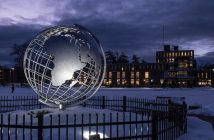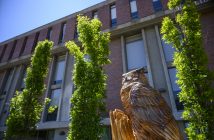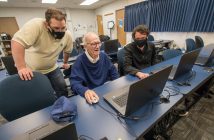President Barack Obama was inaugurated into his second term in office three months ago, and regardless of whether he was their candidate, students who were part of the election process last fall will hold onto the experiences they gained for a lifetime.
Westfield State offered many opportunities for students and staff alike to get involved in the 2012 presidential campaign and election as well as contests at the state level. In addition to talking campaign in class, students participated in the national Democratic and Republican Conventions, held on-campus voter registrations and attended panel discussions, learning lessons about bipartisan politics and about the electoral process in general.
The conventions
Eight students attended one of the national conventions, which were held in August and September 2012. They gained experience and got an inside view of the election process and had resources, news and ideas to bring back to campus and discuss with others.
The students participated in seminars presented by The Washington Center, partially sponsored by the Westfield State Foundation. Professor David Smailes taught in the seminar in Charlotte.
Brittany Moniz ’14, a political science and communication major, attended the Republican National Convention in Tampa, Fla., and remained actively involved with the election process even after coming back to the University, taking an interest in discussing the campaign with her peers.
In addition to learning the importance of each individual vote in an election, Moniz also learned that the political process is polarizing the nation, separating the American people, rather than uniting them.
“I think the key to progress is more bipartisan thinking at all levels of government, as well as among the American people,” she said.
Juan Gonzalez ’14, a political science major, attended the Democratic National Convention in September in Charlotte, N.C. He also took an active role in the campaign as vice-president of the Political Science Club, attending all of the presidential Debate Watch parties that the Political Science Club and Communication department co-sponsored to promote civic engagement and political awareness on campus.
“These events sparked an educational foundation towards understanding the presidential candidates, issues and the political process,” he said.
Gonzalez also said he hopes that one day Americans can work together in a bipartisan manner. “This will level the playing field of opportunity for all Americans in which a core American value of life, liberty and the pursuit of happiness and the American Dream can be once more achieved,” he said. “The rapid polarization of both parties is only setting a framework of Congressional gridlock, and, in the process, ignoring the issues that are most pressing to all Americans.”
Education is key
David Smailes, chair of the Political Science department, said students had many ways to take part in the election process. In the classroom, there were lessons woven into the curriculum for political science majors with concentrations in law as well as in the curriculum for American Politics, Public Administration and International Relations classes.
Courses related to politics and political issues were also offered in other departments, such as Political Communication, which was offered by the Communication department.
“Beyond the classroom, we had events like the Top Trends in Politics 2012 convocation, debate watches during the presidential and vice presidential debates and registration drives,” Smailes said.
“All of this is important,” he added. “First, civic engagement is a fundamental part of living in a community, and politics is one way a person can become involved. Second, I think the experience of thinking about political issues brings one to realize that the future is truly at stake when we make political decisions.”
According to Smailes, students have much to gain by being involved in the election process. The knowledge gained benefits them for the long-term. “When people engage in the electoral process, I think they discover several things: their own ability to help shape events, the need for citizens to be engaged in shaping their lives and the perspective that comes through participation in the promise and limits of the electoral process,” Smailes said.
Marsha Marotta, dean of Undergraduate Studies who attended the national conventions with students in 2008 and 2012, said it was a thrill to observe and be part of the changes that students experienced when they participated in political events.
“At the conventions, students see in action the ideas they have studied in the classroom, and they see what a difference events such as party conventions can make on the national level as well as for the individuals who are part of it,” Marotta said. “One of our important goals at Westfield State is to provide civic learning combined with opportunities for Democratic engagement. We want to help instill lifelong habits of participation in which students see themselves as part of the fabric of their communities, both large and small.”
Getting the vote out
Student Government Association President Stephanie Close ’13, a history and political science major, involved herself on campus by encouraging students of Westfield State to register to vote.
“After the voter registration deadline, I pushed for students to educate themselves on the candidates and to get to the polls on election day.”
“I have always been interested in politics,” she added. “I strongly believe that everyone should exercise their right to vote. It is a right most people in the world do not have, and we are very lucky to live in a Democratic society.”




